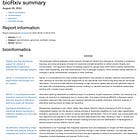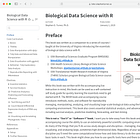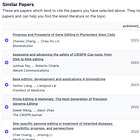Moving from biotech to academia
Thoughts and advice on transitioning from a career in industry biotech to academia. 1.4k words, 6 minute reading time.
I recently wrote a piece about leaving academia for biotech.
I left academia for industry in 2019. I spent four years at a consulting firm before joining Colossal Biosciences. This week I’m returning to the University of Virginia School of Data Science as a tenured associate professor and dean of research.
The transition from academia to industry can be tricky, but it’s also increasingly common. There are far fewer academic jobs available than there are trainees coming out of grad school and postdoc positions.
What’s talked about less (because it happens less!) is the return trip. And it’s harder. Much harder.
Why? Academia is a prestige economy built around publications, teaching, funding, and visibility. Industry, even at companies doing lots of R&D, operates under a different currency: deliverables, velocity, product, and revenue, with a stronger focus on protecting IP than spreading knowledge. Spend long enough away, and the things that matter in academia begin to atrophy, at least in how they appear on paper.
So if you're in industry and even thinking about going back, here are some practical things to focus on now, not later.
Publish. No seriously, publish.
Publications are the coin of the realm in academia. If you’re not authoring papers, even as middle author, you’re invisible to many academic search committees. Make publication a priority, even if your industry work is proprietary or siloed. Can you spin off a methods paper? Collaborate with a former colleague? Co-author a review? Find a way. If nothing else, consider publishing some of your open-source work as an independent scientist to a preprint server like bioRxiv or arXiv. I did this with a little side project, and I have a few more in mind once I can find the time.
Depending on the size of your company you may be able to convince leadership that publication is good for the company. I worked at a multidisciplinary scientific services and technical consulting firm for several years after I left academia before joining a biotech startup. No one was coming to my company to buy software like rplanes or pracpac. They were coming to my company to buy expertise and time from the people who can build things like rplanes and pracpac, and we could point them to the papers we published to prove our bona fides. Publications served as a flag in the ground, proven past performance we could cite for new consulting services contract proposals.
Keep your academic CV up to date
I kept my industry at two pages max, highlighting practical skills and accomplishments over a long list of papers. My academic CV is about 40 pages long. Update your CV regularly. And not just the publications. Make sure you add any abstracts, posters, invited talks, teaching, mentoring, grant writing (even internal grants). List these as you would if you never left. Even if you’ve been managing roadmaps and timelines for years, hiring committees still want to see whether you've kept one foot in the scholarly world. It’s hard to do this years later if you haven’t kept your academic CV updated as you go along, so if returning to academia is even a remote possibility for you, update it regularly.
Teach, guest lecture, or mentor
Find a way to stay active in education. Adjunct a class, give guest lectures, volunteer to teach a short course or workshop at your local R User Group or PyData meetup. If teaching is part of the academic role you want, you need receipts. Mentoring interns or postdocs in industry can sometimes count, especially if you can point to outcomes.

If you teach a workshop, put your workshop material online (here’s an example of mine). If you teach more than a few workshops and you have your materials written with Quarto, it’s easy to turn this into a book and it takes all of 10 minutes to self-publish on Amazon or Leanpub.
Write a blog or newsletter
If you’ve been out of academia for a while, a blog or newsletter can do double duty: it’s a portfolio of ideas and a public demonstration that you’re still reading, thinking, and engaging. It doesn’t have to be technical — some of the best academic writing is reflection. Just be present.
Along similar lines, maintain your public-facing profile. Keep your GitHub active, your personal website updated, and your LinkedIn, ORCID, and Google Scholar profiles accurate.
Collaborate with academics
One of the best ways to maintain credibility is to stay close to the source. Collaborate with researchers at universities. Serve on thesis committees. Co-author grant applications. Even SBIRs can count here. In my previous industry/consulting role I was able to partner with James Madison University and Elder Research to get SBIR funding for environmental monitoring for harmful algal blooms, and we published a preprint on some of the phase 1 work. While here at Colossal I got to collaborate with researchers at the University of East Anglia, the Globe institute at the University of Copenhagen, the Mauritian Wildlife Foundation, Durrell Wildlife Conservation Trust, the government of Mauritius, and the University of Kent. These kind of academic collaborations count for a lot if you can make them happen.
Really go out of your way to try to make this happen, even if it’s not a part of your day job. These connections often open doors back into academia and they lend credibility when you make your case to search committees.
Stay current with the literature
Reading papers for fun might seem like a luxury you don’t have time for in industry, but if you’re planning to go back to academia, you need to keep current. Read. Annotate. Build a bibliography of stuff you’d cite if you wrote a paper tomorrow (I use Zotero).
Maybe even write about what you’re reading.
Understand what you’re giving up
Going back to academia almost certainly means a pay cut. If you’re leaving a startup, you’re likely walking away from equity that could potentially turn into life-changing wealth. You’ll also go from short feedback loops and funding decisions to heavier bureaucracy and long grant cycles. And as I write this in August 2025, science funding in the US is under attack from all angles. Be honest with yourself about why you want to go back. If it’s because you miss mentoring students, chasing hard problems, or writing papers with your name at the end, great. But don’t underestimate the cost.
Know how your time in industry will be perceived
Academia says it values real-world experience, but it’s often suspicious of it too. You may have run large teams and shipped major products, but if you haven’t published recently, haven’t taught, haven’t stayed visible in academic spaces, your experience may be undervalued. Don’t take it personally but do plan for it.
This is changing in many places. I landed my new position at UVA SDS in no small part because of my industry and startup experience. They’re really leading the way here with this forward-looking stance on entrepreneurship and public-private partnerships. Check out a few of the links below for more.
Phil Bourne: Entrepreneurism, Data Science and a New Building
UVA Data Points Podcast: Venture Meets Mission: A Conversation with Arun Gupta
Final thoughts
Coming back isn’t impossible. But it takes planning. You need to start cultivating your academic shadow long before you try to return. It means publishing when no one’s asking you to, teaching when you don’t have to, and showing up in spaces where your current job might not require you to.
If you do that consistently, you’ll demonstrate that your time in industry hasn’t distanced you from the values of academia. You’ll show that you’ve kept your edge, stayed engaged, and have something valuable to offer that blends both rigor and real-world experience.








Very nice post! :)
So proud of you my friend!